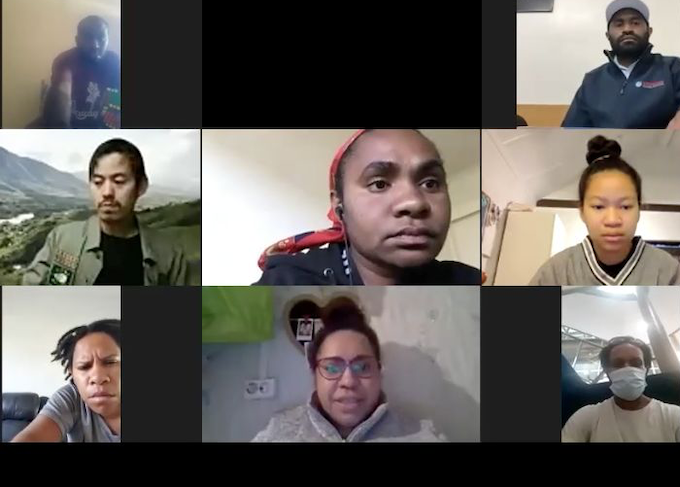
Asia Pacific Report newsdesk
An umbrella organisation representing Papuan students worldwide has been formed with a renewed commitment to strengthening their efforts to gain “quality education”.
Five country groups affiliated to the International Alliance of Papuan Students Associations Overseas (IAPSAO) met virtually yesterday to make a united stance on Papuan education, affirming their appeal last month for Indonesian President Joko Widodo to hear their concerns.
Opening the meeting, Dessy F. Itaar, president of the Papuan Student Association in Russia (IMAPA Russia), declared that the organisation was committed to achieving quality education for Papuans.
- READ MORE: Papuan students appeal for meeting with President Jokowi to air grievances
- Indonesia denies claims by Papuan students over education setback
- Global Papuan student body condemns Jakarta’s disruption of study funds
- Mahasiswa Papua di luar negeri deklarasikan IAPSO – Tabloid Jubi [Bahasa Indonesian]
- Other Papuan education reports
“That’s our main goal. Whatever happens, we will keep fighting until we get our rights,” she said.
The virtual meeting was a continuation of an earlier consultation on January 26 when the students expressed concern over policy changes that they believed would impact on education and Papuan students studying abroad.
Other Papuan student associations affiliated to IAPSAO besides the Russian-based one include the Papuan Students Association in the United States and Canada (IMAPA USA-Canada), the Papuan Students Association in Japan (IMAPA Japan), the Papuan Students Association in Germany (PMP Germany) and the Papuan Students Association in Oceania (PSAO).
Previously, student presidents united under the IAPSAO name were known as the Association of Papuan Students Abroad.
Renaming witnessed
Witnessed during the virtual conference by “hundreds of Papuan students” from countries such as Australia, Canada, Germany, Japan, New Zealand, Russia, Germany, Indonesia and the United States, PSAO president Yan Piterson Wenda declared the renaming of the international organisation IAPSAO on behalf of the five presidents who were signatories.
Earlier, Itaar had stressed that although Papuan students were sent overseas to focus on their studies, it was important for the presidents to unite and speak out about the problems faced by fellow students.
“As presidents who represent every organisation that we lead, there is one moral burden that we carry — which is not thinking about ourselves, we must think about all members in each organisation,” she said.
Only Papuans know the struggle of Papuan inner souls, so Papuans should first help each other before other people help Papuans, Itaar said.
“The only people who can wake us up are Papuans.
When “our friends from the USA and New Zealand shared their struggles”, fellow Papuans from Japan, Russia and Germany agreed to support them.
“We Papuan children must get a quality education, whatever it is,” she said.
No political agenda
“Meilani S. Ramandey, president of IMAPA Japan, said the working team demanding the rights of the current and future Papuan generations had no political agenda. It worked only for educational issues.
“As Papuan students, we stick to this principle, it is not affiliated with any kind of political agenda.”
The students want to know the status of their scholarship programme, which is run under the policies of Papua provincial Governor Lukas Enembe.
“This is important so that all of us do not misunderstand,” said Ramandey.
Reporting on a meeting last week between representatives of the Papuan Students Association in Oceania and the Indonesian Ambassador to New Zealand, Fientje Maritje Suebu, and the head of the Papua Province Human Resources Development Bureau (HRDB), Aryoko Rumaropen, and his staff, PSAO president Yan Piterson Wenda recalled that the bureau had no power to respond to demands by the students.
“The Head of HRDB appreciates the steps taken by the students. The HRDB is disappointed with the policies taken by the central government, so the Indonesian Embassy must respond to this problem,” Wenda said.
“Then, the HRDB said frankly that they had no money. That’s why now all of my friends can’t buy food and pay for accommodation and other needs.
“In principle, HRDB is with us and will forward our aspirations to the Governor. We are waiting for the embassy to proceed with our demands.”
Embassy responded well
Dimison Kogoya, president of the Papuan Students Association in the United States and Canada, reported that the Indonesian Embassy in USA and Canada had responded well to the students’ letter.
“We have held a meeting and at the time of the meeting, we emphasised that our demands should be forwarded to the President,” said a computer science student at Johnson and Wales University in North Carolina.
President Reza Rumbiak of the Papuan Students Association in Germany said Papuan students who were studying in Germany remained in solidarity with students in the USA and New Zealand.
He said a letter had been received from the Indonesian Embassy in Berlin in response to the request by students for a dialogue with President Widodo – but the reply contained 18 points of rebuttal.
“The pressure on me as student president is very intense. But we in Germany support our brothers and sisters in the USA and New Zealand because our DNA as Papuans is communal,” said Rumbiak.
IAPSAO issued a four-point declaration to:
- Make the International Alliance of Papuan Student Associations Overseas (IAPSAO) an umbrella organisation for all Papuan student organisations domiciled overseas;
- Improve and maximise coordination and communication in efforts to protect, prevent, anticipate, and defend the educational rights of Papuan students overseas;
- Affirm IASAO is an independent and academic forum; and
- Make decisions in this forum based on mutual consensus.














































